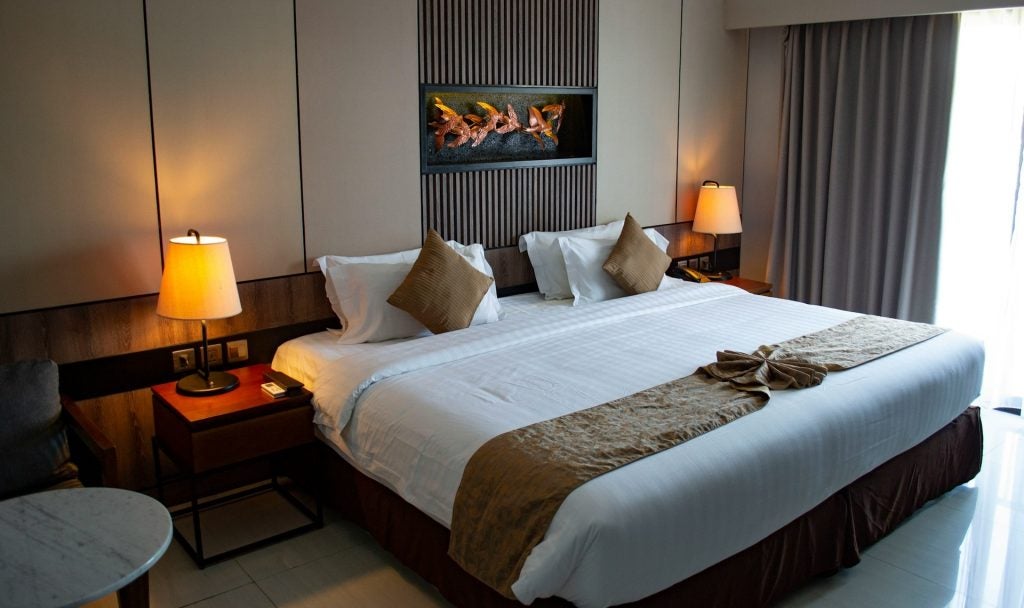
BAUER PALLADIO, VENICE
“Italy invented hospitality with some of the leading hotels in Europe, and we should not be fearful of following up those standards,” says Francesca Bortolotto Possati, owner of the Bauer Hotels in Venice.
Having opened her third hotel, the Bauer Palladio, last year, Bortolotto has proven her success in gauging the desires of guests in the luxury market. Her emphasis is on the individual, backed up by first-class service and spacious accommodation, reflecting the personality of the building and the city. She believes this sets the Palladio ahead of branded rivals and traditional hotels.
“Huge properties pop up in Asia every day with enormous financial investment, but we need to make the most of our artistic and cultural background,” she says. “The building is the priority and just happens to have rooms so people can be guests of the building.”
It’s a credo she has followed at the Palladio: the sixteenth-century convent on Giudecca Island has been converted into 37 rooms and 13 suites, while retaining its private garden.
For Bortolotto, the focus on design is a vital part of the overall offering, and needs to be carried out properly. She has reservations about ‘extreme’ design-led hotels. “I think people are looking for luxury that is not just an updated shower, but a lifestyle which is discreet and personalised,” she says.
How well do you really know your competitors?
Access the most comprehensive Company Profiles on the market, powered by GlobalData. Save hours of research. Gain competitive edge.

Thank you!
Your download email will arrive shortly
Not ready to buy yet? Download a free sample
We are confident about the unique quality of our Company Profiles. However, we want you to make the most beneficial decision for your business, so we offer a free sample that you can download by submitting the below form
By GlobalData“There are a lot of new design hotels that are attracting younger tourists who are looking to experience something very trendy, but you have to be careful that it’s not also very disposable. The first contemporary designs are fun but the ones after can just become cheap, poor copies, and lose their value.”
CIPRIANI, VENICE
The five-star Cipriani in Venice, owned by Orient-Express since its purchase from the Guinness family in 1976, says its winning formula is providing a historic Venetian experience with first-class service. Managing director Natale Rusconi says he has nothing to fear from independent or design-led competitors.
He explains that with only 104 ‘keys’ – so called because more than half the rooms are suites – the hotel is ’boutique’. “At the time I came here in 1977 the hotel was the number one in Venice and it is still the number one and probably the most expensive in Venice and in Italy,” he says.
The hotel has one of the highest profit margins of the Orient- Express establishments, fuelled by a 78% occupancy rate, 22% repeat visitor record, and an average stay of over four days. However, according to Rusconi, it is the facilities that maintain the hotel’s position – and with 20,000m² of gardens, three restaurants, four boats running round the clock, yacht berths, the largest swimming pool in Venice, 225 staff and even its own vineyard, it is easy to see why.
“There has been talk of other hotels competing, but they are not in the same league, you just have to read the comments of our guests,” he says. While design hotels such as the Bulgari in Milan are beautiful and attract the attention of the media, he feels they will ultimately go the way of those designed by Andree Putman in the 1980s: “No-one remembers them,” he says.
While the Cipriani is part of a brand, it is run very much as an independent. “The philosophy is to have a general manager who supervises the hotel as if they were the owner of the place,” says Rusconi. “There is very little interference from London.”
GRAND HOTEL AND STRAF HOTEL , MILAN
In Italy’s fashion capital, Milan, the Bertazzoni family, which owns the five-star Grand Hotel et de Milan, has expanded into the world of design with the four-star Straf, the brainchild of Vincenzo de Cotiis, an Italian fashion designer, boasting an industrial-looking lobby, bedroom walls of raw cement, black floor tiles, scratched mirrors and bucket basins.
Sarah Mancino, of the Bertazzoni family, believes both hotels have a unique style. “The Grand Hotel is a five-star classic hotel which has preserved the history and charm of an eighteenth-century mansion, while the Straf is a four-star urban-extreme design hotel,” she says. “The decision to open the Straf as an extreme design hotel was a response to a lack of such a hotel in the city at this point in time.”
At the helm of both a traditional and a design-led hotel, Mancino believes there is a market for both. “People are curious to try new hotels, not just design ones – they can be attracted by the novelty, by the interior design, by the price,” she explains.
“It also happens that some people will go back to their original hotel after trying a new one, so it’s not enough to attract people with a new design. Good service is fundamental as guests become more and more demanding.”
Both The Grand Hotel and the Straf target a mainly business clientele, with a higher percentage of leisure guests at the Straf. Occupancy rates are high at both, though the four-star Straf has higher profitability.
Mancino believes independent hotels have to work harder than brands in today’s market. “The independent hotel market is struggling against globalisation and cannot afford the sales power of the largest chain hotel companies,” she says. “Unless independent hotels have a unique feature it will be increasingly difficult for them to maintain their market share.”
GRAND HOTEL VERSUS HOTEL DUOMO, RIMINI
In Italy’s seaside resort of Rimini, the five-star Grand Hotel is being challenged by a modern upstart in the town centre. While the Grand has played host to Princess Diana and the Queen of Jordan, it is the Ron-Arad designed Hotel duoMO which is leading the restoration of the resort as a fashionable place for young, wealthy Europeans. The noMi club on the ground floor has glass walls allowing wealthy fashionistas to see and be seen.
Out of town, the Grand Hotel is facing competition from the all-suite rivieragolf, designed by architect Marco Gaudensi. But the Grand is fighting back, with summer parties on its private beach, which have become the hottest ticket in town.
PEACEFUL COEXISTENCE
While independent designer hotels have injected some intensity into competition for high-end business, Franco Arabia, President of the Associazione Direttori Albergo, believes they can successfully coexist with traditional ‘grande dames’.
Capturing the essence of Italian hospitality is the key to success. “Hotels in Italy have the same hospitality that you would find in an Italian home and it’s about maintaining our culture of hospitality,” he says. “Hospitality is still the making of a good hotel.”







